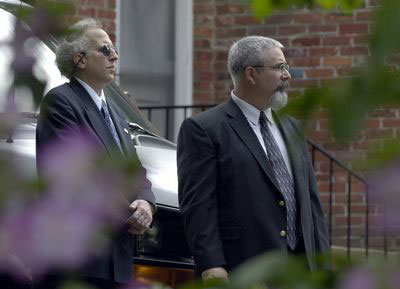Dusty Abroad
Foggo is a long-time associate of Brent Wilkes, the defense contractor who is accused of bribing disgraced former Representative Duke Cunningham and allegedly providing him with prostitutes as well. The San Diego Union-Tribune has previously reported that Wilkes and Foggo “were college roommates at San Diego State, best men at each other’s weddings, and each named a son after the other.” Foggo recently acknowledged that he attended Wilkes-sponsored poker parties at Washington-area hotels and sometimes hosted the parties at his home.

FBI agents raiding Foggo’s home and office
Even before the raid it was known that Foggo’s ties to Wilkes were being examined internally at the CIA and by federal law enforcement authorities. One question being asked is if Foggo steered contracts to Wilkes, whose companies have received tens of millions of dollars worth of government money in recent years.
I called and emailed Foggo’s lawyer, William G. Hundley, on Friday and Saturday, but was unable to reach him. He has previously denied any wrongdoing on Foggo’s part and said his client is “really more of a victim here.”
Foggo worked as a logistics expert for the CIA for several decades and has been based in Tegucigalpa, Honduras, as well as Vienna and Frankfurt. In addition to supporting CIA covert and overt operations abroad, Foggo often made arrangements for and escorted visiting congressional delegations. In the fall of 2004, Goss mysteriously “plucked him from obscurity,” in the words of the New York Times, and named Foggo to be the CIA’s executive director—the number-three position at the agency.
Over the past few days, I’ve spoken to six former CIA officials—all of whom spoke on condition of anonymity—who know Foggo or are well acquainted with his work at the agency. They provided a number of previously unreported revelations about Foggo’s career, particularly regarding his years in Honduras in the early 1980s, when the agency was using the country as a base both to support the Nicaraguan contras and for a variety of other covert programs in Central America.
During this period, Wilkes accompanied several congressional delegations to the region, “where they met with Foggo and contra leaders,” the Union-Tribune reported this weekend. “Three of Wilkes’ former friends say he told them he was involved in assignations between some of the legislators and prostitutes in Central America.” (Wilkes denied the allegations.)
My sources said that Foggo was a regular at the Maya Hotel’s casino in Tegucigalpa; in 1993, the Chicago Tribune described the hotel as having once been “the unofficial headquarters for those who came here to help—or watch—the U.S. try to purge neighboring Nicaragua and El Salvador of communist threats.”
Foggo, said my sources, was also a regular at a local bar named Gloria’s, which one source said was chiefly known for having “a brisk hooker trade.” While my sources had no direct knowledge of Foggo consorting with prostitutes, several said that simply being at a place like Gloria’s was deemed to be a serious security problem and that Foggo’s nocturnal habits were a source of great concern within the local CIA station.
Foggo, said one source, was “capable in the field but lacked a moral compass.” This source explained that working for the agency overseas “already puts you in a difficult position . . . [because] part of your job might involve violating the laws of the country you’re in. You don’t put a red light on your head by going to places where there’s gambling and hookers—it’s a stupid risk.”
“He was a logistics guy,” said one source about Foggo, “not a spy. Any time he was spending there was personal business, not for the CIA.”
Beyond drawing attention to himself, Foggo’s nightlife also raised concerns from a counterintelligence standpoint because of the risk that he could be entrapped by the Russians and their allies. “During the coldest days of the Cold War,” said another agency official, “hookers and casino employees were exactly the type of people we wanted on our payroll, and so did the KGB.”
“Gloria’s was a ticking bomb,” said the source cited above. “There were a lot of Cuban women there and you had to be mindful that you might be set up.” This person said that before he was sent to Tegucigalpa, his boss at the CIA gave him a “fire-breathing” lecture about staying far away from spots like Gloria’s. “He [told me], ‘If you get into trouble down there, you make sure you get killed because I’ll kill you otherwise.’” (It should be noted that, according to my sources, Foggo was not the only American intelligence officer who frequented the Tegucigalpa nightspots named above.)
Several of the former CIA officials had similar stories about Foggo’s days in Vienna and Frankfurt. (There’s a former CIA station chief in Vienna who I was told knows the full history of Foggo’s escapades in Europe. I called him at his current job in Texas and he declined to discuss the matter.) They were stunned when they heard that Goss had picked Foggo for the executive director position. “He should never have gotten the job,” said one. “With a guy like that, the past is always going to catch up with you.”
“This guy had a career’s worth of bad judgment,” said the source who was stationed in Honduras with Foggo. “He was in deep trouble when [George] Tenet headed the agency and was set to go when Tenet left [in mid-2004]. Then Goss and his Gosslings come in and he becomes the number-three. People were thunderstruck.”
sfux - 2. Mai, 08:45 Article 4385x read
















































